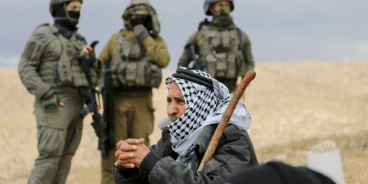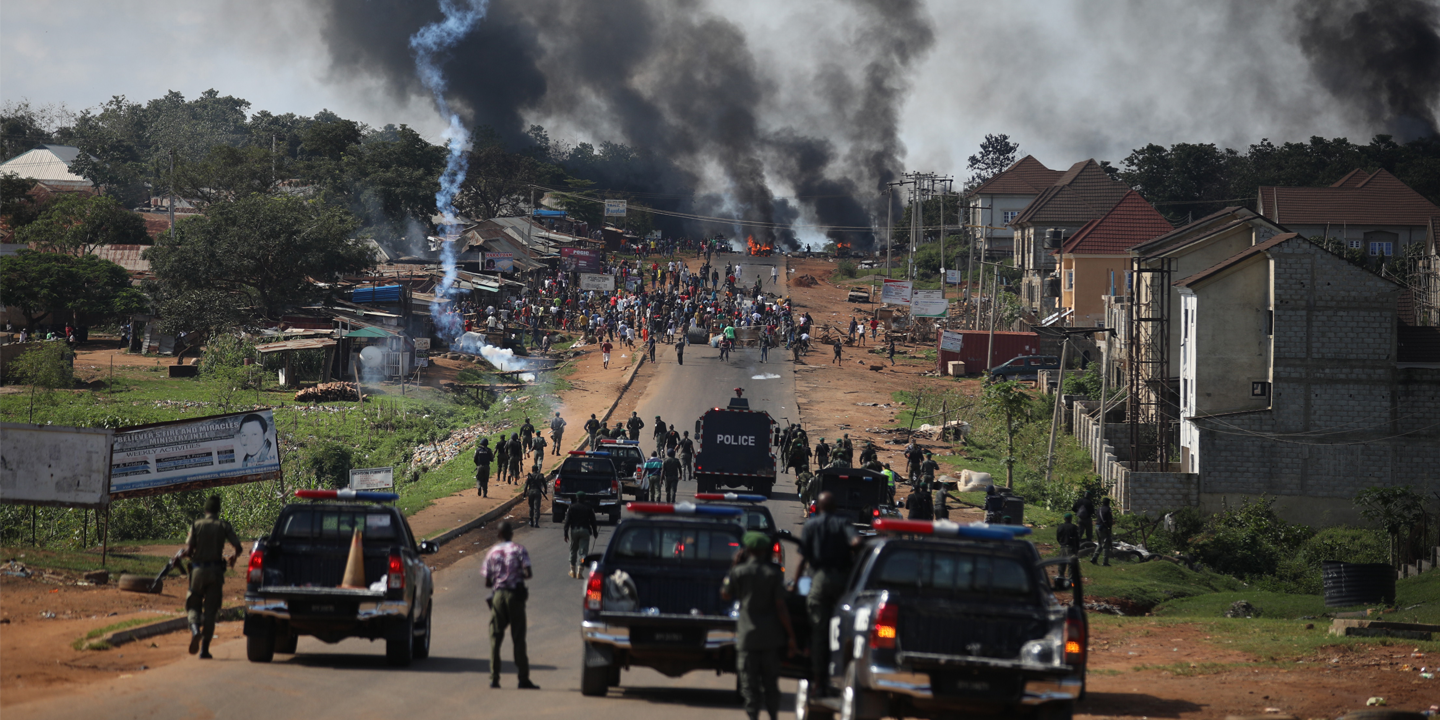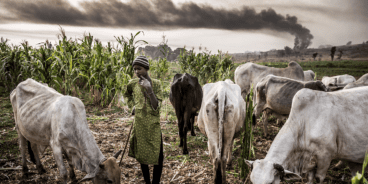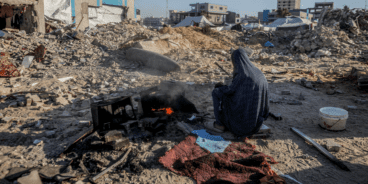

Atrocity Alert No. 225: Nigeria, the Sahel and Côte d’voire
Atrocity Alert is a weekly publication by the Global Centre for the Responsibility to Protect highlighting situations where populations are at risk of, or are enduring, mass atrocity crimes.
Violent crackdown on #EndSARS protests in Nigeria
Demonstrations against police brutality and poor governance in Nigeria have resulted in several deaths after security forces opened fire at a protest site in the Lekki district of Lagos last night (20 October). At the time of publication, eyewitness reports and posts on social media describe the excessive and deadly use of force by security forces, including shooting with live ammunition into crowds of peaceful protesters. The protests in Lagos were taking place despite the government imposing a curfew and deploying riot police in an attempt to restore order following weeks of civil unrest.
Since the beginning of October tens of thousands of protesters have taken to the streets across Nigeria to call upon the authorities to abolish a police unit, the Special Anti-Robbery Squad (SARS). Originally established to tackle the problem of violent crime, SARS has been widely accused of grave human rights violations, including extrajudicial killings, torture and arbitrary arrests. The #EndSARS campaign spread rapidly via social media in Nigeria, inspiring widespread protests that have mainly been led by young activists.
On 11 October President Muhammadu Buhari announced the disbandment of the SARS unit as “the first step in our commitment to extensive police reforms.” A new police unit was formed, the Special Weapons and Tactics (SWAT) team, to fill the gap resulting from the dissolution of SARS. Training of this team started on Monday, 19 October, in collaboration with the International Committee of the Red Cross, according to the Nigerian authorities.
Despite President Buhari disbanding SARS, demonstrations have continued, with protesters demanding further protections against police brutality, including psychological evaluation of all officers and an independent oversight mechanism. According to Amnesty International, at least 15 people, including two police officers, have been killed since the beginning of the protests.
The Nigerian security forces must immediately end the use of disproportionate and deadly force against peaceful protesters and should uphold the universal right to freedom of assembly, association and expression. The government of Nigeria needs to urgently reform its security sector, including by incorporating international humanitarian and human rights law into all military and police training. There should also be a full and independent investigation into the shootings at the Lekki tollgate.
‘Downward spiral’ of deadly violence in the Sahel
On 15 October an Islamist armed group attacked three villages in northern Burkina Faso, killing 20 civilians at a market. The incident followed an attack earlier this month, when at least 25 internally displaced persons (IDPs) were killed when a convoy enroute to their homes in Pissila, in the central-north, was ambushed by an armed group. According to the UN Refugee Agency, men were separated from the women and children before being executed.
The crisis in neighboring Mali also continues to worsen. On 16 October a UN peacekeeper was killed in the Kidal region. Three days earlier an Islamist armed group killed at least 12 civilians in central Mali, marking the deadliest attacks since President Ibrahim Boubacar Keïta was overthrown in a military coup in August.
The recent attacks are symptomatic of the violence and insecurity spreading across the Central Sahel countries of Burkina Faso, Mali and Niger, endangering the lives and livelihoods of millions of people. Civilians face potential atrocity crimes as a result of attacks by Islamist armed groups and state security forces, as well as growing conflict between ethnic militias and community “self-defense groups.” According to the UN Office for the Coordination of Humanitarian Affairs, more than 6,600 people have been killed in the past year.
Regional instability has also exacerbated the dire humanitarian crisis. The number of IDPs has increased from 70,000 to approximately 1.6 million in less than two years. Populations suffer as a result of ongoing attacks on schools, health centers and other public institutions and essential services. At least 4,000 schools have already been forced to close, while COVID-19 restrictions and ongoing conflict have forced 12.8 million children out of school.
Yesterday, 20 October, during the Ministerial Roundtable for the Central Sahel, UN Secretary-General António Guterres stated that, “we need to reverse this downward spiral with a renewed push for peace and reconciliation… we need to make space for vital humanitarian assistance and investments in development and people.”
Christine Caldera, Research Analyst at the Global Centre for the Responsibility to Protect, said that, “strategies to counter violent extremism and growing violence across the Central Sahel must include reforms aimed at strengthening local governance, improving access to resources, and ending impunity for human rights abuses. The Burkinabe government and the transitional government of Mali, with the support of the UN peacekeeping mission in Mali, the UN Office for West Africa and the Sahel and the UN Office of the High Commissioner for Human Rights, should investigate all mass killings and ensure perpetrators are brought to justice.”
Deadly ethnic clashes in Côte d’Ivoire ahead of presidential election
Tensions in Côte d’Ivoire continue to escalate ahead of presidential elections scheduled for 31 October. Last Friday, 16 October, clashes broke out in Bongouanou, the stronghold of former Prime Minister and opposition candidate Pascal Affi N’Guessan. Individuals fought with machetes, looted shops and burned houses, including N’Guessan’s home. At least two people were killed.
Residents allege that people from the local Agni ethnic group, which predominantly support the opposition, were fighting Dioula people from the north of the country, who tend to support the current President, Alassane Ouattara. Violence continued on 20 October during opposition protests in Bonoua, where at least one person died and a dozen were seriously injured.
The election period has already been marred by sporadic episodes of ethnic violence, increased hate speech and heightened political tensions. The situation has deteriorated since August when President Ouattara announced his decision to run for a third term after his preferred successor, Prime Minister Amadou Gon Coulibaly, unexpectedly died. The Constitution limits the number of presidential terms to two, but the nation’s top court determined that the 2016 revision of the constitution means that Ouattara’s two previous terms do not count, allowing him to run again.
Last week the main opposition candidates – former President Henri Konan Bédié and Pascal Affi N’Guessan – issued a joint statement calling for their supporters to boycott the election. The two opposition leaders also urged the government to reform the central electoral bodies and postpone elections until a new candidate for Ouattara’s party can be found. In recent weeks, several opposition parties have also called for widespread “civil disobedience,” sparking fears of further violence. Fifteen people were killed during political protests in August.
The authorities must ensure that the human rights of all Ivorians – including the right to peaceful assembly – are equally protected and respected. All political leaders should also engage in an inclusive dialogue to mitigate the growing risk of further violence before and after the upcoming election.
Related Content


Atrocity Alert No. 444: Nigeria, Haiti and South Sudan
